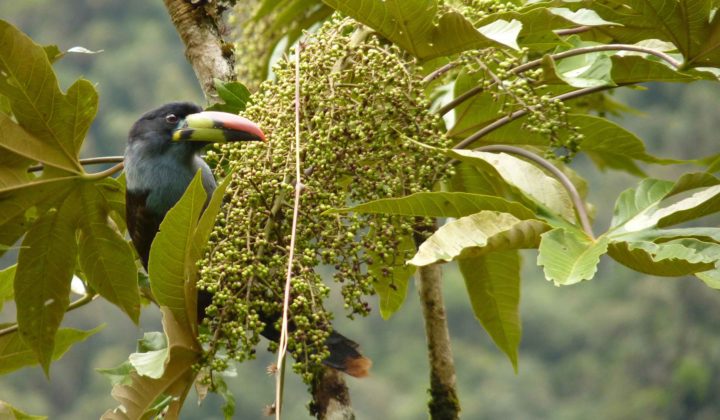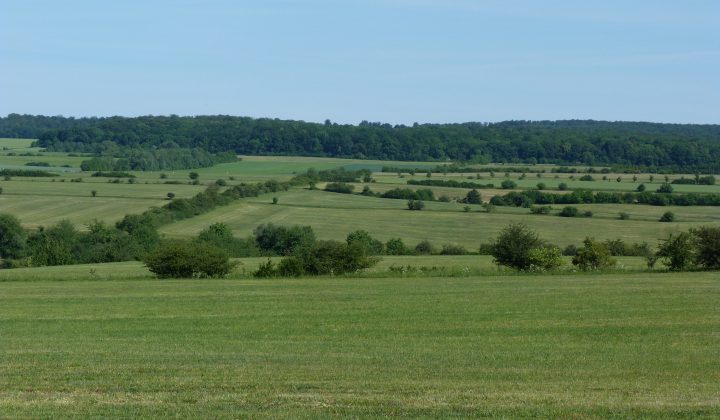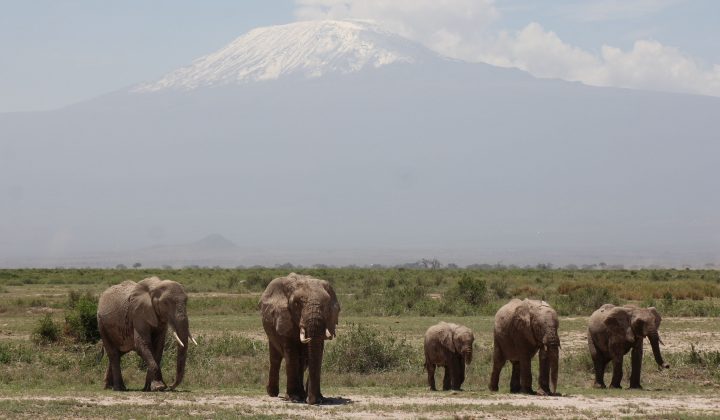Leitung
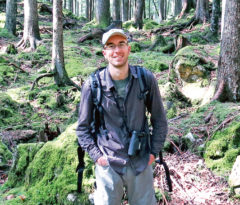
Fields of interest
I am fascinated by interactions between organisms, especially if they are mutually beneficial for both partners*. To disentangle webs of interacting organisms, I study species interactions in ecological communities along anthropogenic gradients and across large spatial scales. My research aims at the identification of the major ecological and evolutionary drivers of species interactions and at a better understanding of the functional importance of species interactions for entire ecosystems. I hope that this work will help to improve predictions of the consequences of species loss for ecosystem functioning. (*I usually become enthusiastic if one of the interaction partners has wings and a beak.)
Research
– Mutualistic plant-animal networks
– Biodiversity and ecosystem functioning
– Functional diversity of ecological communities
– Pollination and seed dispersal by animals
– Plant demography
Methods
– Observational and experimental field studies
– Meta-analyses across large spatial scales
– Trait-based network analysis
– Structural equation modeling
Study areas
– Tropical Andes
– Tropical and subtropical Africa
– Germany
Associate Editor of Functional Ecology
Press coverage:
Interaction Networks
Picky fruit-eating birds are more flexible [English]
Science Daily, 11 May 2017
Domino-Effekt beim Artensterben [German]
Spiegel Online, 6 January 2017
The loss of plant species triggers the extinction of animals [English]
Science Daily, 4 January 2017
Flexible Tropen-Arten [German]
Neue Züricher Zeitung (CH) – Print und Online, 26 September 2012
Tropische Artenvielfalt macht Vögel nicht zu Spezialisten [German]
Der Standard (A), 21 September 2012
Conservation biology
Warum tropische Wälder dringend große Vögel brauchen [German]
Der Standard (A), 24 December 2016
Loss of large fruit-eating birds threatens tropical forests [English]
Science Daily, 7 December 2016
Ants plant rainforests, one seed at a time [English]
Mongabay.com, 14 April 2014
Biodiversity = More (and Better) Coffee [English]
The Scientist, 11 February 2014
Functional Fragments [English]
Conservation Magazine, 29 November 2011
Überraschender Nutzen – Auch Regenwaldinseln erfüllen ökologische Funktionen [German]
Deutschlandfunk (D), 16 December 2011
Nützlicher Flickenteppich [German]
Welt (D), 28 November 2011
Selbst fragmentierter Wald behält seine ökologischen Funktionen [German]
Der Standard (A), 25 November 2011
Recent publications
Bender et al. 2019. Projected impacts of climate change on functional diversity of frugivorous birds along a tropical elevational gradient. Scientific Reports, https://doi.org/10.1038/s41598-019-53409-6
Dehling et al. 2020. Similar composition of functional roles in Andean seed‐dispersal n etworks, despite high species and interaction turnover. Ecology, https://doi.org/10.1002/ecy.3028
Donoso et al. 2020. Downsizing of animal communities triggers stronger functional than structural decay in seed-dispersal networks. Nature Communications, https://doi.org/10.1038/s41467-020-15438-y
Nowak et al. 2019. Projecting consequences of global warming for the functional diversity of fleshy‐fruited plants and frugivorous birds along a tropical elevational gradient. Diversity & Distributions, https://doi.org/10.1111/ddi.12946
Peters et al. 2019. Climate–land-use interactions shape tropical mountain biodiversity and ecosystem functions. Nature, https://doi.org/10.1038/s41586-019-1048-z
Sonne et al. 2020. Ecological mechanisms explaining interactions within plant–hummingbird networks: morphological matching increases towards lower latitudes. Proceedings of the Royal Society B, https://doi.org/10.1098/rspb.2019.2873
Schleuning et al. 2020. Trait-Based Assessments of Climate-Change Impacts on Interacting Species. Trends in Ecology & Evolution 2020, https://doi.org/10.1016/j.tree.2019.12.010

Research interests
My research focusses on the interplay between plants and animals and their interactions with the abiotic and biotic environment. In particular, I study the dynamics of temperate and tropical forest ecosystems across elevational and land use gradients. In one of my research themes, I study the dispersal of seeds by animals, which is one of the key ecosystem services for natural forest restoration. I combine a diverse set of methods, ranging from field observations and experiments to molecular and meta-analytic approaches and advanced statistical modelling to project the response capacity of plants to land use and climate change.
In one of my projects, we examine seed dispersal pattern by nutcrackers (Nucifraga caryocatactes) along environmental gradients in alpine pine forests. We investigate, how seed deposition by nutcrackers and other biotic and abiotic drivers relate to the potential of Swiss stone pine seedlings (Pinus cembra) to establish.
DFG project NE 1863 2-2 “The role of intraspecific variation in seed dispersal, traits, and genetic diversity for the response capacity of plants to climate change”; PhD student Valentin Graf
In other projects in the tropical Andes, we study how abiotic and biotic filters affect the regeneration of plants of various life history traits across an elevational and disturbance gradient in Southern Ecuador. In Northern Ecuador, we study how seed dispersal networks (birds and rodents) reassemble across a forest disturbance gradient in the Chocó region.
DFG projects NE 1863 3-1 “Trait-dependent effects of biotic and abiotic filters on plant regeneration”, NE 1863 3-2 “Trait-dependent effects of abiotic and biotic filters on plant regeneration in mountain dry forest and mountain rain forest”; PhD students Maciej Barczyk, Lea Kerwer
DFG project NE 1863/4-1 “Seed dispersal by frugivorous birds, bats and rodents” PhD student Anna Rebello Landim
Mitarbeiter

Fields of interest
I am broadly interested in the effects of global change on biodiversity and ecosystem functioning. My research aims at resolving the mechanisms by which global change (e.g., climate and land-use change) alters interactions between organisms and how this affects ecosystem processes such as pollination, seed dispersal, herbivory and predation. To answer my research questions, I study how the taxonomic and functional diversity of communities, as well as the structure of species interaction networks change along climate and land-use gradients (e.g., on tropical mountains). I link these changes in community structure to ecosystem processes to assess the potential consequences of biodiversity loss for ecosystem functioning. Moreover, I combine macroecological and palaeoecological perspectives to explore the effects global change on species diversity and biotic interactions at large spatiotemporal scales. To integrate the perspectives from these various research disciplines, I use diverse tools including, structural equation models, meta-analyses, and Bayesian statistics.
Keywords
Community ecology,functional ecology, networkecology,global change biology,biotic interactions, biodiversity, ecosystem functioning, seed dispersal,pollination,herbivory, predation
External Links
Selected Publications
Albrecht, J., Peters, M. K., Becker, J. N., […], Steffan-Dewenter, I. & Schleuning, M. (2021) Species richness is more important than species turnover for ecosystem functioning along an elevational gradient. Nature Ecology & Evolution 5:1582-1593. https://doi.org/10.1038/s41559-021-01550-9
Albrecht, J., Classen, A., Vollstädt, M. G. R., […], & Schleuning, M. (2018) Plant and animal functional diversity drive mutualistic network assembly across an elevational gradient. Nature Communications 9:3177. doi:10.1038/s41467-018-05610-w
Albrecht, J., Hagge, J., Schabo, D. G. et al. (2018) Reward regulation in plant–frugivore networks requires only weak cues. Nature Communications 9:4838. doi:10.1038/s41467-018-07362-z
Albrecht, J., Bartoń, K. A., Selva, N. et al. (2017) Humans and climate change drove the Holocene decline of the brown bear. Scientific Reports 7:10399. doi:10.1038/s41598-017-10772-6
Albrecht, J., Berens, D. G., Jaroszewicz, B. et al. (2014) Correlated loss of ecosystem services in coupled mutualistic networks. Nature Communications 5:3810. doi:10.1038/ncomms4810
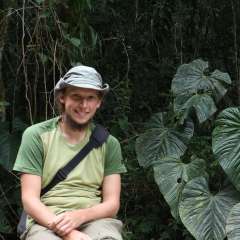
Research interest
I am a nature lover fascinated mainly by plants and interactions between species. Currently I work as a PhD student on plant regeneration in tropical mountain forest in Ecuador. I consider studying ecology and evolution, particularly in tropics, as the unique opportunity to understand better relationships between species in the changing world. The aim of my ongoing research is to study biotic and abiotic factors influencing seedling communities across an elevational and disturbance gradient in tropical Andes of Southern Ecuador. The study is a part of the research unit “RESPECT Environmental changes in biodiversity hotspot ecosystems of South Ecuador: RESPonse and feedback effECTs” funded by the German Research Foundation and my PhD is supervised by Dr. Eike Lena Neuschulz.
Keywords
plant-animal interactions, seedling communities, seed dispersal, biodiversity
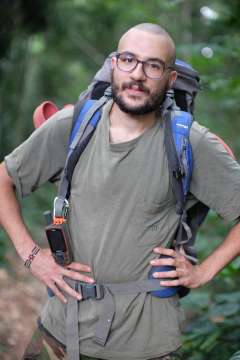
Research Interests
I am broadly interested in how organisms interact with each other and their environment and what this means for people. In my research I investigate the role of species interactions in providing regulating ecosystem services like seed dispersal, pest control and habitat provision. My research is based on the southern slope of Mount Kilimanjaro, Tanzania, and is part of the DFG-funded research unit “The role of nature for human well-being in the Kilimanjaro Social-Ecological System” .
The slopes of Kilimanjaro offer a fantastic opportunity to look at how species interactions, and the services they underpin, change across a variety of ecosystems defined by altitude and land-use. I aim to build a conceptual framework that allows to quantify the role of species in the provision of ecosystem services and use it to analyse the data that I am collecting on the mountain.
Keywords
Community ecology, species interactions, biodiversity, ecosystem services, nature’s contributions to people
External links
https://www.researchgate.net/profile/Giovanni-Bianco
https://scholar.google.com/citations?user=droRXqwAAAAJ&hl=en
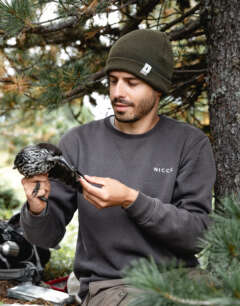
Research interests
I am intersted in a wide range of ecological processes including demographic population analyses, movement ecology, and plant-animal interactions.
My PhD project brings me to the Swiss Alps, where I study the Swiss stone pine, a coniferous tree occupying timberline habitat. Swiss stone pine populations are often small, and genetic diversity is generally low. I aim to find out how well this species can adapt to changing climatic conditions.
The Swiss stone pine maintains a close mutualistic bond with the spotted nutcracker, a scatter-hoarding bird of the crow family. The charismatic bird harvests and caches up to 100’000 pine seeds every summer, to then feed on them for the rest of the year. By forgetting about some of his caches, the nutcracker acts as the pine’s sole long-distance seed disperser, which earned him the nickname „feathered forester“.
To understand the pine’s potential to adapt to changing conditions, I am studying both the tree and its disperser. I am excited to combine different apporaches like seed transplant experiments, genetic analyses, trait-based data, and fine-scale movement analyses. Together, these approaches will give insight into the pine’s recruitment success across an array of biotic and abiotic factors.
Keywords
functional ecology, biotic interactions, seed dispersal, climate change

Research interests
I am captivated by the dynamic nature of species interactions, with a particular interest in the effects of anthropogenic drivers on a macroecological scale. My research often focuses on temperature as both an abiotic driver of environmental change and as a physiological boundary. Within my PhD project, I aim to unravel the effects of global change on trophic networks, with a focus on the role of omnivores for food web rewiring. By compiling a large-scale database on trophic interactions of omnivores, I am able to ascertain the influence of anthropogenic global change drivers such as rising temperatures and intensifying land-use on trophic response mechanisms. This project is being funded by the Deutsche Forschungsgemeinschaft (DFG) and supervised by Dr. Jörg Albrecht.
More generally speaking, I use quantitative analysis of large data sets spanning multiple animal taxa for a wide range of topics linked to global change. Previous work has been focused on the influence of temperature on physiology and population dynamics of ectothermic animals and dated phylogenomic reconstruction.
Key-words
Trophic interactions, biodiversity, global change, thermal physiology, omnivory, macroecology, climate change
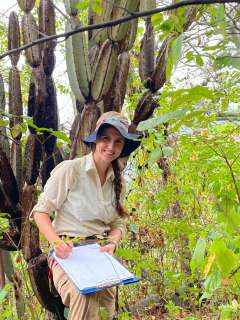
As an ecologist and botanist, I am broadly interested in many ecological processes, especially in drivers of plant diversity, plant community assembly rules and regeneration patterns.
I find it essential to asses these processes not only from a botanical point of view but trying to understand how species interactions among and between taxa can shape ecosystem processes. This is particularly important when studying the regeneration ability of ecosystems and their resilience against natural or anthropogenic disturbances. I’m passionate about understanding how insights in these processes can come in hand for conservation and restoration efforts, as well as human benefits.
In my previous research I focused on vegetation assembly patterns as well as the relationship between plant biodiversity and ecosystem services in the Southern Black Forest. In my current research for my PhD project, I study the influence of abiotic and biotic factors on seedling communities in the Dry Forest of the tropical Andes of Southern Ecuador. Therefore, I compare seedling recruitment between two elevations as well as between disturbed and non-disturbed habitats. The Tropical Dry Forest in the Tumbesian region is highly biodiverse but also strongly threatened. With my research I aim to gain more insights in the regeneration dynamics of this unique ecosystem. My project is part of the research unit “RESPECT Environmental changes in biodiversity hotspot ecosystems in Southern Ecuador: RESPonse and feedback effECTs” funded by the German Research Foundation and I am supervised by Dr. Eike Lena Neuschulz and PD Dr. Matthias Schleuning.
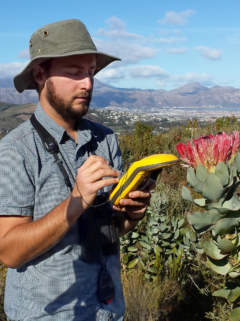
Research interests
ProteaNet: Spatiotemporal dynamics of plant-animal interaction networks
ProteaNet is the follow-up project of ProteaBird and investigates Protea communities in South African fynbos. I will extend spatial and short-term analyses of ProteaBird, conducted by Baptiste Schmid and Henning Nottebrock, and will study how plant-based resources determine long-term dynamics of animal communities. I will address fundamental ecological questions about mechanisms that underlie life-history variation, species coexistence, and the structuring of mutualistic and antagonistic plant-animal interaction networks.
I will specifically study the resource allocation for animal-mediated indirect interactions among Protea plants. I will also test how the spatiotemporal dynamics of Protea-based resources (nectar, pollen, seeds) affect the functional and interaction diversity of bird, rodent, and insect pollinators and seed predators. This will enable us to investigate how mutualistic and antagonistic plant-animal interaction networks assemble in space and time and how the spatiotemporal dynamics of these networks affect plant community dynamics.
I am working under the supervision of PD Dr. Matthias Schleuning. The project is conducted together with Prof. Dr. Frank Schurr and the PhD student Huw Cooksley from the University of Hohenheim, in collaboration with Prof. Dr. Karen Esler and with Prof. Dr. Anton C. Pauw at the University of Stellenbosch. The project is funded by the German Research Foundation.
Functional diversity of birds along land-use and elevational gradients on Mt. Kilimanjaro, Tanzania
For my Diploma thesis, I worked within the DFG-funded research unit KiLi. The aim was to test whether differences in avian ecomorphological traits depict the functional roles (dietary and foraging preferences) of bird species on Mount Kilimanjaro. I also investigated changes in the functional diversity of the bird communities along an elevational gradient and with land-cover change. This research gives insights into how anthropogenic impacts could modify ecosystem functions of birds.
Keywords
Mutualistic and antagonistic plant-animal interaction Networks, Biodiversity and ecosystem functioning, Functional diversity, Pollination by animals, Observational and experimental field studies, Trait-based network Analysis
Press coverage
Citizen Science
Vögel beobachten und mitteilen [German] SWR, 7 Feb 2017

As a biologist living in the tropics, I have always been interested in understanding how nature works,especially mutualistic interactions. Prior to my PhDposition,I was studying plant-pollinatormutualistic relationships between flowers and hummingbirds. Now, for the PhD project I decided toextend my knowledge to the post-pollination phase, i.e., seed dispersal. Throughthis workIaimtounderstand the effects ofbiotic and abiotic factors on plant functional diversity, dispersal and seedrain in the tropical dry forest of southern Ecuador. Through my results I hope to contribute to theunderstanding of the importance of ecological processes (i.e., seed dispersal)in the sustainabilityand resilience of ecosystems. I work under the supervision of PD Dr. Matthias Schleuning and Dr.Eike Lena Neuschulz at the Biodiversity and Climate Research Center Senckenberg.
My interest in ecology is to understand the processes and mechanisms that sustain the ecosystemand to understand the importance of (mutualistic) interactions in the functioning of ecologicalcommunities.

Biodiversity conservation and restoration have always been my main interests in Ecology. Within these topics, I am passionate about mutualistic interactions and the ecological processes derived from them. Understanding the role of each character in these processes and the outcome of their entanglement has driven my research in the last years. In particular, I am interested in exploring functional traits as a tool to both understand species roles in ecological processes and also improve restoration management. I am especially motivated to understand and investigate means to restore ecological processes and functions once they are lost (after species extinction, for example). This is why I am a big enthusiast of the Reassembly of species interaction networks project, which my PhD project is part of: it aims to understand how highly diverse networks dis and reasemble after land use (pasture and agriculture). Within this project, I will study the reassembly of seed dispersal networks and how species traits shape this process. I am working under the supervision of PD Dr. Matthias Schleuning and Dr. Eike Lena Neuschulz, at the Senckenberg Biodiversity and Climate Research Centre.
Key-words:
Plant-animal interactions, seed dispersal, functional diversity, restoration, ecosystem functioning
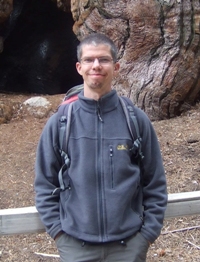
Stein, K., M. Templin, I. Hensen, M. Fischer, D. Matthies, and M. Schleuning (2012) Negative effects of conspecific floral density on fruit set of two neotropical understory plants. Biotropica 45: 325-332.
Schleuning, M., N. Farwig, M. K. Peters, T. Bergsdorf, B. Bleher, R. Brandl, H. Dalitz, G. Fischer, W. Freund, M. W. Gikungu, M. Hagen, F. H. Garcia, G. H. Kagezi, M. Kaib, M. Kraemer, T. Lung, C. M. Naumann, G. Schaab, M. Templin, D. Uster, J. W. Wägele, and K. Böhning-Gaese (2011) Forest fragmentation and selective logging have inconsistent effects on multiple animal-mediated ecosystem processes in a tropical forest. PLoS One 6: e27785.
Schleuning, M., M. Templin, V. Huamán, G.P. Vadillo, T. Becker, W. Durka, M. Fischer, and D. Matthies (2010) Effects of inbreeding, outbreeding, and supplemental pollen on the reproduction of a hummingbird-pollinated clonal Amazonian herb. Biotropica 43: 183-191.
Alumni
Irene M.A. Bender
D. Matthias Dehling
Isabell Donoso
Silvia Gallegos Ayala
Maria A. Maglianesi
Dominik Merges
Marcia C. Muñoz Neyra
Larissa Nowak
Marta Quitián
Francisco V. Saavedra
Vinicio Santillán
Baptiste Schmid
Maximilian G.R. Vollstädt
Diana Carolina Acosta Rojas
